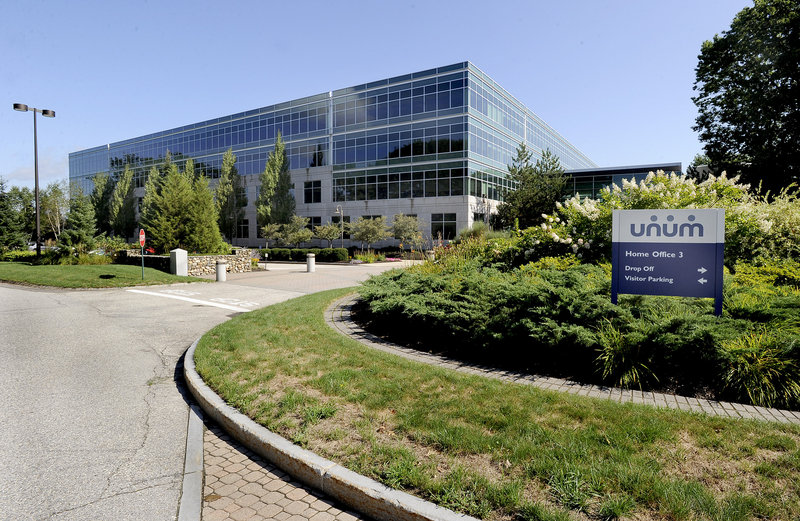Welcome to Portland, Maine, the disability insurance capital of the world.
From this city came Unum Group, a major insurance company whose Maine presence gave rise to a local industry.
“Portland is the center of the disability universe,” said Joseph Foley, chief marketing officer. “There are spin-off businesses, reinsurance businesses, claim operators. They all fed off Unum.”
Unum Group’s headquarters are no longer in Portland, but thousands of employees, including top executives in the company’s U.S. division, still work in offices on Congress Street not far from the Portland International Jetport.
Unum executives say sales have flattened in recent years with the economic downturn. But the company has responded by developing new products and continuing a broad education campaign aimed at increasing the public’s awareness of disability insurance.
“The amount of money you will earn in your lifetime will exceed the value of that house. But lots of people don’t insure their income. It’s their single biggest asset,” said Kevin McCarthy, Unum US president and CEO, from his Portland office.
Unum Group is a publicly-traded company with some 10,000 employees and revenue of nearly $10.2 billion in 2010, up from $10.1 billion in 2009. The company reported revenue of $10.5 billion in 2006.
Unum Group has three divisions: Unum UK, Colonial Life, based in Columbia, S.C., and Unum US, which is based in Chattanooga, Tenn., but led by executives in Portland.
With 3,100 staff in Maine and a state payroll of about $238 million, Unum US is among the state’s largest employers. Claims adjustors, nurses and doctors are among the Portland employees, as are human resources, financial and marketing staff.
Unum US reported operating income of $218 million in the second quarter of 2011, up 1 percent from $216 million during the same period last year. The division’s 2010 revenue was $6.24 billion, up about 1 percent from 2009.
The primary product of Unum US is disability insurance, which covers income employees lose while temporarily off the job. Maternity leave, cancer treatment and back injuries are types of disabilities that might be covered.
The company is a so-called group insurer — it’s clients are employers, like governments, schools and businesses, which offer insurance to their employees as a benefit. Some companies cover part or all of the costs; others require employees to pay themselves.
Unum also sells life, dental and long-term care insurance, which helps pay health-care costs for people with chronic illnesses. Maine clients include Bath Iron Works, L.L. Bean, Idexx Laboratories and others.
Unum competes with larger insurance companies like MetLife, Prudential Financial, The Hartford and Standard Insurance Company. Those firms tend to sell a broader range of products, while Unum’s specialty is disability insurance.
Unum’s roots extend to 1848, when Union Mutual was chartered in Maine. At the time a life insurance company, Union Mutual was based in Boston, but moved to Portland in 1881.
Union Mutual was renamed Unum in 1986. The company merged with Colonial Life in 1993 and with Provident in 1999, forming UnumProvident Corp.
In 2007 the company’s name changed again, to Unum Group.
Executives say Unum’s long presence in Portland helped make the city a disability insurance hub.
Among the insurance-related companies based in Greater Portland, or with operations here, are Westbrook-based Disability RMS, which has more than 300 staffers, General Re Corporation in South Portland, actuarial and consulting firm Milliman Inc., Portland-based consulting firm SurePoint Advisors and South Portland’s Smith Group.
Barry Lundquist, president of the Portland-based trade group Council for Disability Awareness, estimates those firms and others employ up to 1,000 people in the area.
The disability insurance industry has struggled in the last few years, as the number of people with the insurance declined 1 percent to 2 percent annually, said Lundquist. He estimates some 50 million people have private disability insurance.
“Companies have laid off people (and) the number of companies that provide benefits dropped slightly,” he said. “In times like these, people aren’t spending, they are saving.”
McCarthy said disability insurance sales mirror economic trends. If jobs aren’t being created, there are few new employees enrolling. Also, companies and workers these days have less disposable income.
At the same time, economic troubles create opportunities. That’s because people who are unsure about their financial future, and those who lost money in the stock market, often turn to insurance to protect their income, said McCarthy. Uncertainties about health care and the long-term viability of Social Security have the same effect.
“People start to think, what are my other options?” said McCarthy.
Unum responded to the recession by offering more “voluntary” products that employees buy through their employer but keep if they change jobs. Unum also focused sales efforts on companies in relatively stable industries, like finance, education and technology.
Executives say the future of the industry lies partly in economic recovery and partly with public education about the benefits of disability insurance.
“People understand health insurance, and life and dental (insurance), but they don’t have a great understanding of disability (insurance),” said Lundquist at the Council for Disability Awareness. “The average person dramatically underestimates their risk of being disabled.”
McCarthy said one in three employees will become disabled for a couple months during their career, but many don’t insure their income, which can cost as little as $300 per year.
Unum has been active on Capitol Hill, raising lawmakers’ awareness about the benefits of disability insurance products. And the company works with employers to make sure employee communications are clear and devoid of confusing industry jargon.
“The more people know about (disability insurance), the more they understand why protection is important,” McCarthy said. “It’s a very valuable social benefit.”
Jonathan Hemmerdinger can be reached at 791-6316 or:
jhemmerdinger@mainetoday.com
Copy the Story Link
Send questions/comments to the editors.




Success. Please wait for the page to reload. If the page does not reload within 5 seconds, please refresh the page.
Enter your email and password to access comments.
Hi, to comment on stories you must . This profile is in addition to your subscription and website login.
Already have a commenting profile? .
Invalid username/password.
Please check your email to confirm and complete your registration.
Only subscribers are eligible to post comments. Please subscribe or login first for digital access. Here’s why.
Use the form below to reset your password. When you've submitted your account email, we will send an email with a reset code.